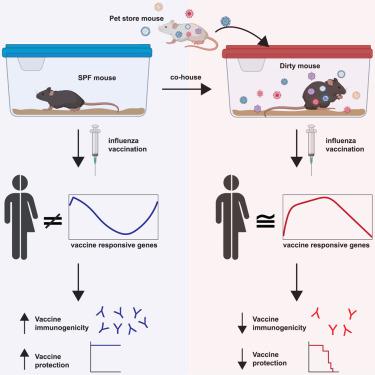Cell Host & Microbe ( IF 20.6 ) Pub Date : 2021-11-02 , DOI: 10.1016/j.chom.2021.10.001 Jessica K Fiege 1 , Katharine E Block 2 , Mark J Pierson 2 , Hezkiel Nanda 3 , Frances K Shepherd 1 , Clayton K Mickelson 1 , J Michael Stolley 1 , William E Matchett 1 , Sathi Wijeyesinghe 1 , David K Meyerholz 4 , Vaiva Vezys 1 , Steven S Shen 3 , Sara E Hamilton 2 , David Masopust 1 , Ryan A Langlois 1

|
Laboratory mice comprise an expeditious model for preclinical vaccine testing; however, vaccine immunogenicity in these models often inadequately translates to humans. Reconstituting physiologic microbial experience to specific pathogen-free (SPF) mice induces durable immunological changes that better recapitulate human immunity. We examined whether mice with diverse microbial experience better model human responses post vaccination. We co-housed laboratory mice with pet-store mice, which have varied microbial exposures, and then assessed immune responses to influenza vaccines. Human transcriptional responses to influenza vaccination are better recapitulated in co-housed mice. Although SPF and co-housed mice were comparably susceptible to acute influenza infection, vaccine-induced humoral responses were dampened in co-housed mice, resulting in poor control upon challenge. Additionally, protective heterosubtypic T cell immunity was compromised in co-housed mice. Because SPF mice exaggerated humoral and T cell protection upon influenza vaccination, reconstituting microbial experience in laboratory mice through co-housing may better inform preclinical vaccine testing.
中文翻译:

具有不同微生物暴露史的小鼠作为临床前疫苗测试的模型
实验室小鼠包括用于临床前疫苗测试的快速模型;然而,这些模型中的疫苗免疫原性通常不能充分转化为人类。对无特定病原体 (SPF) 小鼠重建生理微生物体验可诱导持久的免疫学变化,从而更好地概括人类免疫力。我们检查了具有不同微生物的小鼠在接种疫苗后是否能更好地模拟人类反应。我们将实验室小鼠与宠物店小鼠共同饲养,这些小鼠具有不同的微生物暴露,然后评估了对流感疫苗的免疫反应。人类对流感疫苗接种的转录反应在共同饲养的小鼠中得到了更好的概括。尽管 SPF 小鼠和合养小鼠对急性流感感染比较敏感,但疫苗诱导的体液反应在合养小鼠中受到抑制,导致挑战时控制不佳。此外,保护性异种亚型 T 细胞免疫在共同饲养的小鼠中受到损害。由于 SPF 小鼠在接种流感疫苗后增强了体液和 T 细胞保护,因此通过共同饲养在实验室小鼠中重建微生物体验可能会更好地为临床前疫苗测试提供信息。











































 京公网安备 11010802027423号
京公网安备 11010802027423号